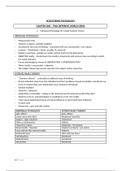ECOSYSTEMIC PSYCHOLOGY
CHAPTER ONE – TWO DIFFERENT WORLD VIEWS
1. Individual Psychology VS. Family Systems Theory
INDIVIDUAL PSYCHOLOGY
Westernized roots
Western, Lockean, scientic traditon
Socialised in this way of thinking – consistent with our communites our culture
Lockean – Modernism = linear causality (A causes B)
Reality is out there, outside our minds and the truth is to be discovered
OBJECTIVE reality – break down into smaller components and uncover laws according to which
the world operates
Pursue knowledge by means of OBSERVATION EXPERIMENTATION
These results = measurable objectve
The subject (observing) remain separate from object and be value free
SYSTEMIC FAMILY THERAPY
‘’Counter-cultural’’ – contradicts traditonal ways of thinking
Directs atenton away from the individual and from problems viewed in isolaton and directs our
focus to relatonships and relatonship issues between individuals
Kantan traditon
Observer = atenton
Subjectvity is inevitable = exitnng in the mind and not the external world of the client
Observer acts on, and partcipates in creatng his or her own reality
“Non-causal dialectcal process of mutual infuence in which both have infuence”
A and B exist
Reciprocity = give-and-take actons
INDIVIDUAL PSYCHOLOGY SYSTEM FAMILY THERAPY
Asks, Why?? Asks, What?
Linear cause and efect Reciprocal Causality
Subject / object dualism Dialectcal
Either or dichotomies Holistc
Value-free science Subjectie / Perceptual
Deterministc / Reactie Freedom of choice / pro-actie
Laws and law like external reality Paterns
Historical Focus Here and now focus
Indiiidualistc Relatonal
Reductonistc Contextual
Absolutstc Relatiistc
1|Page
, 2. Defnitons
Epistemology = A set of immanent rules used in thought by large groups of people to defne reality.
How knowledge is created.
Theory = A set of connected principles serving to explain a group of phenomena of interest to the
researcher or serving as a statement of relatons believed to prevail in a body of observatons.
Theories are informed and specifed by partcular epistemologies.
Model = A projecton of the substance of a less understood or developed domain onto the structure
of a more developed system. You take what you see and project it onto something else.
Technique = A rehearsed or practced procedure or skill to achieve a partcular end/ outcome in
accordance with a model used.
Cybernetcs = The characteristcs of the systemic / cybernetc world is theoretcal relatvity. We
cannot reject one theory and embrace another. Rather, cybernetcs we recognize that each theory
gives meaning to the other and that each has utlity relatve to given context.
2|Page
, CHAPTER TWO – THE HISTORICAL PERSPECTIVE
1930’s & 1940’s
Cybernetcs – Early on = organisaton, patern, and process rather than mater, material and content.
Norbert Weiner (Mathematcian) = Named the science – cybernetcs
1940 = scientsts started to compare inanimate machines with living organisms.
Gregory Bateson
Anthropologist = studies human cultures, traditons, origins, behaviours and societes.
Main contributon was grounds of knowledge and epistemology.
Bridging physical and behavioural science.
Bateson resolved the ancient problem posed by dualistc thinking about mind and body – he set
about translatng the practce of psychiatry into a theory of human communicaton.
1950’s & 1960’s
Conferences called “Circular Causal and Feedback Mechanisms in Biological and Social Systems” ->
changed to CYBERNETICS
Bateson’s Double-Blind Hypothesis (1956) – toward a theory of schizophrenia
Two or more persons, one designated “the victm”
Repeated experiences
A primary negatve injuncton (command, ruling)
A secondary injecton confictng the 1st at a more abstract level, and like the 1 st, enforced by
punishments or signals which threaten survival
A tertary negatve injuncton prohibitng the victm from escaping the feld
All ingredients are NO LONGER necessary when the victm has learned to perceive his
universe in double-blind paterns
Primarily mothers part of the problem – mother-blaming
Nathan Ackerman
Child psychiatrist – family as a social and emotonal unit
Both mother and child go to therapy together not separate
1962 = published Family Process
Combinaton of psychodynamics and the noton of an individual’s social role to understand the
ongoing interacton between hereditary and environment and the maintenance of homeostasis
within and between the person, family, and ultmately society.
Murray Bowen
3|Page
, He introduces triangulaton, intergeneratonal transmission, diferentaton of self, and ultmately
undiferentated family ego mass.
Classic study – entre families of schizophrenic patents are hospitalised
Carl Whitaker
Psychiatrist – started working with John Warkentn as a co-therapy team
Eventually involve spouses and children of patents as part of their treatment approach
Highly unorthodox yet brilliantly efectve approach
Theodore Lidz
Studies neurology – schizophrenia
Rejects Freudian noton (of fxaton at oral stage)
Rejects schizophrenia is caused by maternal rejecton
Moves away from individual to emphasis on family dysfuncton
Lyman Wynne
Signifcance of family in schizophrenia, relatonships = important, communicaton paterns
o Pseudomutuality = A relatonship between two persons in which confict of views or opinions
is solved by simply ignoring it.
o Psuedohostlity = Superfcial alienaton of family members that masks members’ need for
intmacy and afecton
o Rubber fence = Characteristc process through which a family experiences itself, and is
perceived by others, as if it were within an elastc boundary that helps the family members
to maintain a sense of tolerable relatedness and to decrease the threat of divergence from
within and intrusion from without
Ivan Boszormenyi-Nagy
Psychiatrist – psychoanalytc training
Works on impact of intergeneratonal processes, introduces ethical dimension to therapy
Trust loyalty
John Elderkin Bell
See families conjointly, stumbled upon accidentally.
Family Group Therapy = published 1961
1950’s Brought Us
- Happened in afermath of WW2
- Beginning of counter cultural movement
- Hippie generaton start of civil rights ecology movement
- Schizophrenia research was granted money – current theories did not provide a soluton
4|Page






